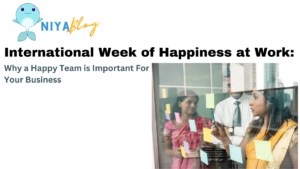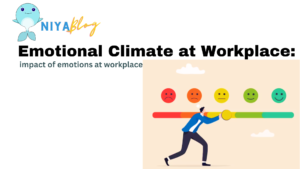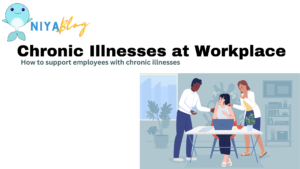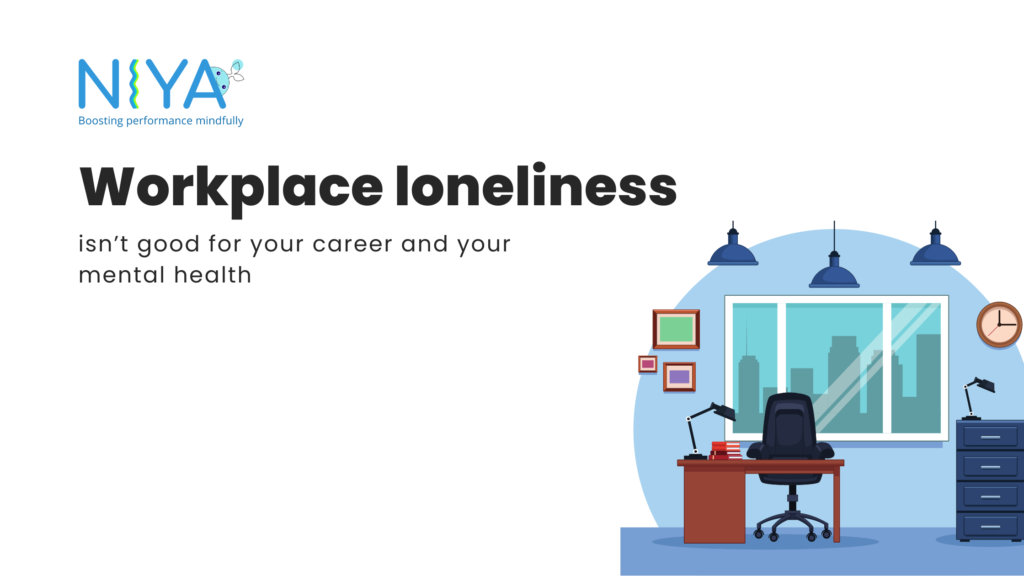
Just like how a tree needs a strong foundation to grow and thrive, a successful career also relies on a supportive and positive environment. However, many people find themselves feeling lonely and isolated in their workplace, which can have a detrimental impact on both their career and mental health.
Research has shown that loneliness can be a significant contributor to a range of mental disorders, including stress, depression, and even suicide in extreme cases. This is particularly concerning for employees who work remotely or in isolation, as they are more susceptible to feelings of loneliness and eventual mental health issues. However, even individuals working in a crowded office can suffer from loneliness.
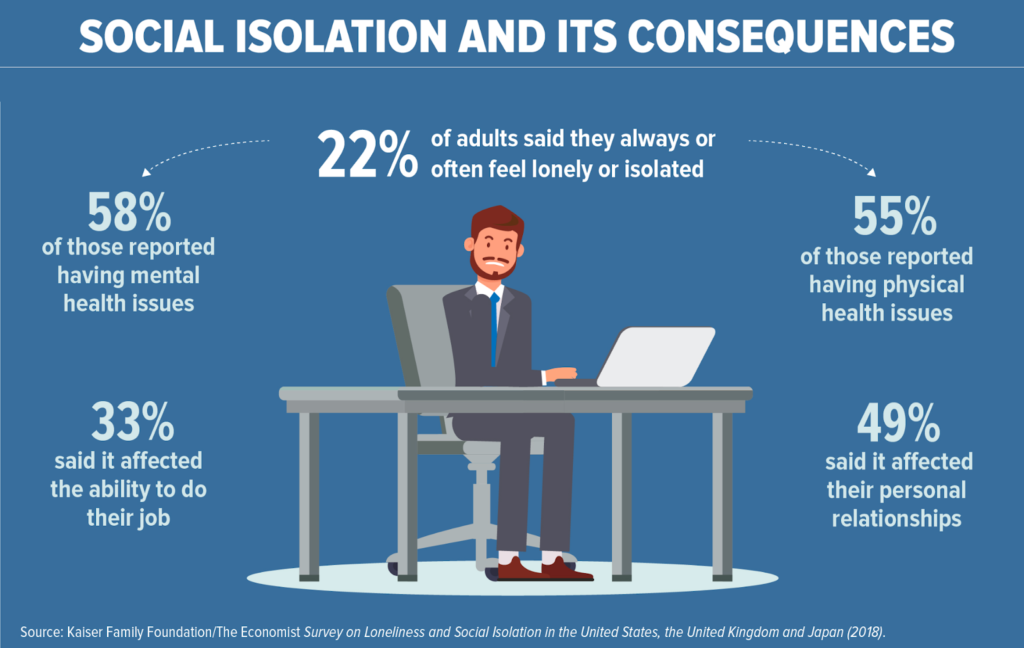
Source: SHRM
With employee wellbeing and productivity becoming a major focus for HR professionals in 2023, it’s crucial that they prioritize addressing the issue of loneliness in the workplace. But how can they go about doing this?
It’s a question that many are grappling with, and one that requires thoughtful consideration and investment from businesses.
In this blog, we’ll explore the surprising ways in which workplace loneliness can impact your career and mental health, and provide tips on how to combat these negative effects. Let’s dive into this important topic.
Causes of workplace loneliness
The causes of workplace loneliness can vary depending on the individual and their specific work environment. Some common causes may include:
- A lack of social interaction with colleagues,
- Feelings of isolation due to remote work or a lack of teamwork,
- A lack of communication or support from supervisors, and
- A company culture that doesn’t prioritize employee well-being or social connections.
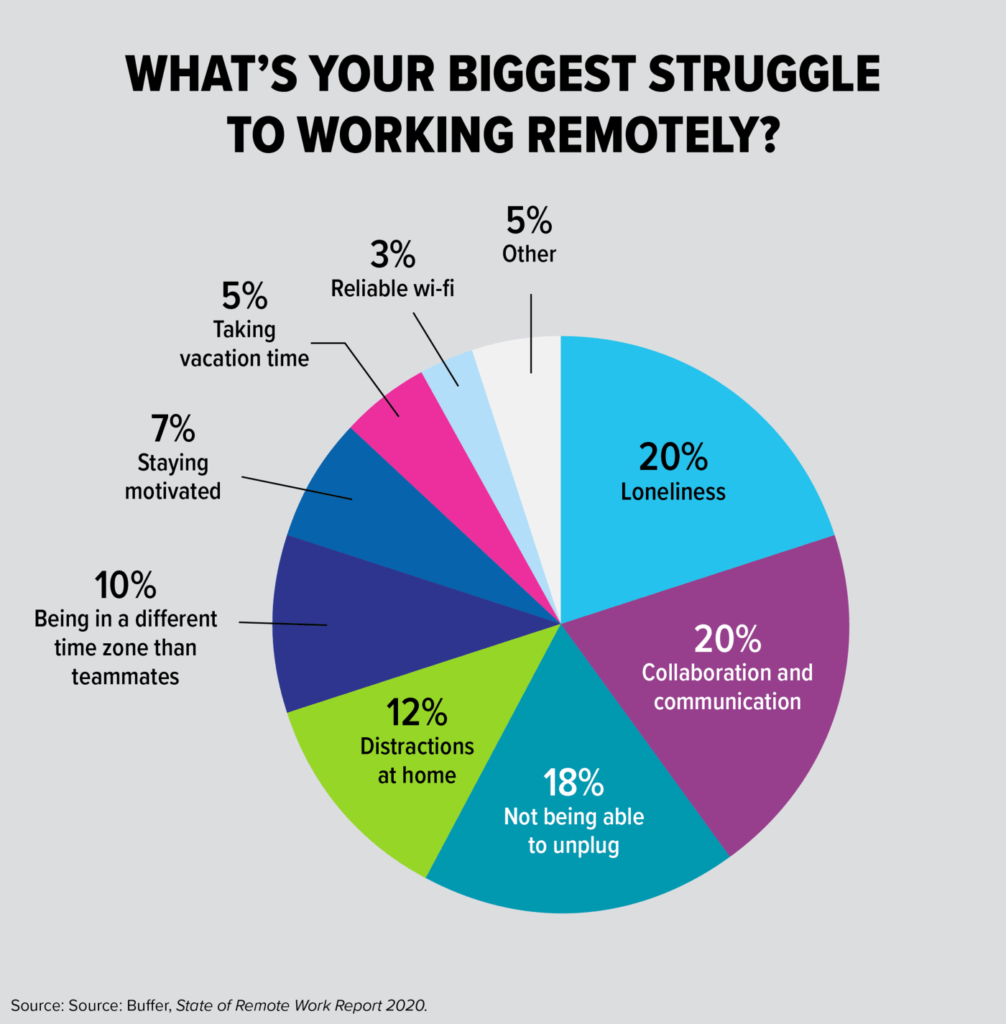
Additionally, factors outside of work, such as personal life circumstances or mental health issues, can also contribute to feelings of loneliness in the workplace.
Building The Case of Loneliness Impacting Your Career/ Health: Individuals
Workplace loneliness is a serious issue that affects both an individual’s mental health and their overall career. When individuals experience loneliness in the workplace, it can lead to a range of negative impacts, including depression, anxiety, stress, and even physical health problems. In fact, research has shown that loneliness can be as damaging to health as smoking 15 cigarettes a day.
In addition to the negative impacts on an individual’s mental and physical health, workplace loneliness can also have a significant impact on their career.
- When individuals feel isolated or disconnected from their colleagues, they may be less likely to collaborate, share ideas, or contribute to team projects. This can lead to decreased productivity and creativity, as well as a lack of engagement and motivation.
- Loneliness can impact an individual’s ability to network and build professional relationships, which can be crucial for career advancement. When individuals feel disconnected from their colleagues and peers, they may miss out on valuable opportunities to learn and grow in their career.
How to combat workplace loneliness: For Individuals
Feeling lonely at work can be challenging, but there are steps you can take as an individual to combat workplace loneliness. Here are some tips:
Initiate conversations: Take the initiative to start conversations with your colleagues. Ask them about their interests and hobbies or ask for their opinions on work-related topics.
Join social groups: Joining social groups at work such as a book club, sports team or volunteering group can provide opportunities to meet new people and form connections.
Take breaks with colleagues: Use your lunch or coffee breaks to spend time with your colleagues. This will help you build relationships with them and get to know them better.
Attend work events: Attend work events such as office parties, team-building exercises or after-work social events. This will help you to connect with your colleagues outside of the office environment.
Communicate with your manager: If you’re feeling lonely or isolated, communicate this to your manager. They may be able to help you connect with other colleagues or suggest ways to improve your social interactions at work.
Remember, building relationships takes time and effort. Be patient and keep trying to connect with others at work.
Building The Case of Loneliness Impacting Your Bottomline: The Organisations

Loneliness can be a pervasive issue in the workplace, and the negative impacts of this phenomenon go beyond just the individual. In fact, loneliness can have a significant impact on both health and well-being, which can eventually impact the overall success of a business.
To illustrate the impact of loneliness, consider a car. A car needs several key components, such as fuel, oil, and tires, to function properly. If one of these components is missing or not functioning properly, the car will not run efficiently, and may eventually break down.
Similarly, employees need a range of components to thrive in the workplace, including social connections, communication, and support. If these components are missing or insufficient, the employee may experience negative impacts on their health and well-being, which can eventually impact their productivity and success in the workplace.
Statistics also highlight the impact of loneliness on health and well-being. For example, research has shown that loneliness can increase the risk of developing a range of physical and mental health issues, including heart disease, depression, and anxiety.
Furthermore, loneliness has been linked to decreased cognitive function and increased risk of mortality. In the workplace specifically, loneliness can lead to decreased productivity, increased absenteeism, and decreased job satisfaction.
To put it simply, the negative impacts of loneliness can have a domino effect, ultimately impacting the overall success of a business. By prioritizing employee well-being and addressing loneliness in the workplace, businesses can create a more positive and productive work environment for all employees.
How to Combat Workplace Loneliness: The Organisations
Combating workplace loneliness requires a multifaceted approach that addresses both the individual and organizational level. Here are a few strategies that can be implemented to combat workplace loneliness:
- Encourage social connections: Encouraging social connections between employees can help to combat feelings of loneliness. This can include team building activities, social events, or simply creating opportunities for employees to interact on a regular basis.
- Create a positive work culture: Creating a positive work culture that prioritizes employee well-being and social connections can help to combat loneliness in the workplace. This can include promoting work-life balance, offering flexible work arrangements, and providing opportunities for professional development.
- Foster communication: Foster open and honest communication between employees, supervisors and colleagues. Encouraging and rewarding sharing of ideas, concerns and feedback is important for creating a culture that values collaboration and openness.
- Prioritize inclusion and diversity: Prioritizing inclusion and diversity can help to create a workplace culture where all employees feel valued and supported. This can include promoting diversity and inclusion initiatives, and creating a safe and respectful workplace for all employees.
Looking for a solution to improve well-being and create a healthier work environment? Niya can help.
Niya helps you evaluate the existing workplace environment and identifies factors that could be adversely impacting staff members’ mental wellbeing. With validated digital tools, expert coaching, and counseling sessions, Niya provides individualized assistance tailored to each employee’s specific requirements.
Through chat and video calls, the Niya app offers support that is accessible anytime and anywhere, benefiting both individuals and organizations. By providing anonymized data, Niya also aids in pinpointing areas requiring targeted interventions, thereby enhancing productivity, performance, engagement, and overall profitability.
It is crucial to create a workplace culture that prioritizes people’s well-being and acknowledges the significance of mental health. By selecting Niya, employees can rely on receiving confidential care, resulting in a happier and healthier workplace, allowing them to flourish.
Ready to tackle the cost of mental health troubles head-on? Email your interest on [email protected]. We will schedule a product demo for you.


